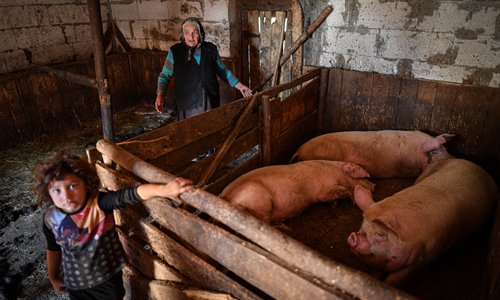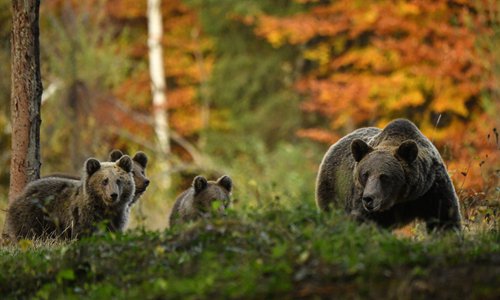HOME >> WORLD
In Romanian countryside, cohabitation grows strenuous
Source:AFP Published: 2019/11/10 19:03:44
When Maria Lacatus' son opened the barn door, it was already too late. "The bear had one of the pigs in its claws," the sobbing 86-year-old says.

The bear had fled through an opening it had made in some wooden planks, Lacatus says, unable to shake the vision of the animal she "almost bumped into."
She lives with her son, daughter-in-law - both take whatever daily work they can find - and their seven children in a house protected by a wooden fence opening onto a muddy yard.
The pigs are a vital source of income.
Romania has Europe's highest number of brown bears which have always been a common sight in Cusma, population about 600 and lying eight hours by road from the capital Bucharest.
But residents say that the bears didn't use to venture into farms to take animals - around 15 cows and pigs have been killed by bears in the last two years, says deputy mayor Florin Griga.
In other parts of the country, humans have been attacked.
In October alone, a bear killed a 47-year-old who was picking mushrooms and a 61-year-old died due to an attack while fishing.
Thirty-two people were attacked, two of them fatally, in 2017 and 2018, according to government data.
Authorities have suggested that communities erect electric fences and use specialized dogs to keep bears away.
But with very few exceptions, such as the central town of Baile Tusnad, the measures have not been carried out.
In response to calls from some in rural areas, senators voted in September to allow brown bears to be hunted over the next five years, citing a problem of overpopulation.
The controversial bill, which still needs approval by deputies, has mobilised several associations into trying to get it blocked.
Some 100,000 people have signed an online petition by the World Wildlife Fund (WWF) asking MPs to reject the bill.

"Man has always intervened to maintain a balance. Stopping this intervention results in the bear population getting out of hand," says senator Tanczos Barna, a supporter of the draft law.
Hunting bears in the nation of 20 million people, known for its large swaths of rural countryside with poor infrastructure, as well as forested mountains and hills, has periodically been permitted, including in the 1970s and again in the 1990s.
Despite Romania joining the EU in 2007, hundreds of bears were killed for almost a decade under a system of waivers that stopped in 2016 due to a public outcry.
Since then, the environment ministry has allowed so-called nuisance bears to be killed - those that bother villagers - and recommends culling only as a last resort.
Some 140 bears were killed in 2017 but the tool is deemed inefficient and bureaucratic by hunters.
Romania is thought to have more than 6,000 brown bears spread across about 30 percent of the country and especially in the Carpathian mountains.
'Trophy hunting'
The encounters with bears in villages are not proof that the population is getting out of hand, insists Silviu Chiriac, of Large Carnivore Initiative for Europe, who has been studying Romania's wildlife for 20 years.
"What has changed is that now everybody has a mobile phone with a camera and internet. Anyone can take a picture of a bear track or of a specimen and post it on Facebook, giving the impression that Romania is besieged by animals," Chiriac told AFP.
Tourists feeding them, inappropriate refuse management, fields of crops extending near their habitat also affect the bears' behavior, according to environmentalists.
Until 2016, hunting as a sport flourished, and bears were given "tons of apples, corn, concentrate [a mix of nutrients] and dead cows brought into the forest to habituate them for trophy hunting mostly," Popescu said, a claim disputed by hunters.
"Their space and ecology changed; the whole system changed [in 2016] when we stopped feeding them," he added.
Scared
Cusma village is close to Dealu Negru, a fairytale-like hill which used to be the hunting ground of former leader Nicolae Ceausescu.
With their backyards going up into the forest, locals fear they are easy prey. Some say they are afraid to go out at night or let their children go to school in the daytime.
Twice in the last few months authorities used the national alert system to warn residents directly on their phones about a bear's presence near Cusma.
Domokos warns that villagers will ultimately take matters into their own hands and start poisoning the bears if the authorities do nothing.
"Either way, this won't end well for the bears," Domokos said.
Newspaper headline: Can’t bear it!

Maria Lacatus (center), 86, recalls the bear attack inside the pigs shelter at her place in Cusma village, Romania on October 17. Photos: AFP
After losing a horse too a few days later, Lacatus now agrees with many of her neighbors in the northern Romanian village of Cusma that hunting the protected species is the only answer.The bear had fled through an opening it had made in some wooden planks, Lacatus says, unable to shake the vision of the animal she "almost bumped into."
She lives with her son, daughter-in-law - both take whatever daily work they can find - and their seven children in a house protected by a wooden fence opening onto a muddy yard.
The pigs are a vital source of income.
Romania has Europe's highest number of brown bears which have always been a common sight in Cusma, population about 600 and lying eight hours by road from the capital Bucharest.
But residents say that the bears didn't use to venture into farms to take animals - around 15 cows and pigs have been killed by bears in the last two years, says deputy mayor Florin Griga.
In other parts of the country, humans have been attacked.
In October alone, a bear killed a 47-year-old who was picking mushrooms and a 61-year-old died due to an attack while fishing.
Thirty-two people were attacked, two of them fatally, in 2017 and 2018, according to government data.
Authorities have suggested that communities erect electric fences and use specialized dogs to keep bears away.
But with very few exceptions, such as the central town of Baile Tusnad, the measures have not been carried out.
In response to calls from some in rural areas, senators voted in September to allow brown bears to be hunted over the next five years, citing a problem of overpopulation.
The controversial bill, which still needs approval by deputies, has mobilised several associations into trying to get it blocked.
Some 100,000 people have signed an online petition by the World Wildlife Fund (WWF) asking MPs to reject the bill.

A bear is pictured next to her cubs at a bear observatory next to Tusnad tourist resort in central Romania, on October 19. Romania has Europe's highest number of brown bears which have always been a common sight in Cusma, but residents say that the bears never used to venture into farms to take animals.
'Maintain a balance'"Man has always intervened to maintain a balance. Stopping this intervention results in the bear population getting out of hand," says senator Tanczos Barna, a supporter of the draft law.
Hunting bears in the nation of 20 million people, known for its large swaths of rural countryside with poor infrastructure, as well as forested mountains and hills, has periodically been permitted, including in the 1970s and again in the 1990s.
Despite Romania joining the EU in 2007, hundreds of bears were killed for almost a decade under a system of waivers that stopped in 2016 due to a public outcry.
Since then, the environment ministry has allowed so-called nuisance bears to be killed - those that bother villagers - and recommends culling only as a last resort.
Some 140 bears were killed in 2017 but the tool is deemed inefficient and bureaucratic by hunters.
Romania is thought to have more than 6,000 brown bears spread across about 30 percent of the country and especially in the Carpathian mountains.
'Trophy hunting'
The encounters with bears in villages are not proof that the population is getting out of hand, insists Silviu Chiriac, of Large Carnivore Initiative for Europe, who has been studying Romania's wildlife for 20 years.
"What has changed is that now everybody has a mobile phone with a camera and internet. Anyone can take a picture of a bear track or of a specimen and post it on Facebook, giving the impression that Romania is besieged by animals," Chiriac told AFP.
Tourists feeding them, inappropriate refuse management, fields of crops extending near their habitat also affect the bears' behavior, according to environmentalists.
Until 2016, hunting as a sport flourished, and bears were given "tons of apples, corn, concentrate [a mix of nutrients] and dead cows brought into the forest to habituate them for trophy hunting mostly," Popescu said, a claim disputed by hunters.
"Their space and ecology changed; the whole system changed [in 2016] when we stopped feeding them," he added.
Scared
Cusma village is close to Dealu Negru, a fairytale-like hill which used to be the hunting ground of former leader Nicolae Ceausescu.
With their backyards going up into the forest, locals fear they are easy prey. Some say they are afraid to go out at night or let their children go to school in the daytime.
Twice in the last few months authorities used the national alert system to warn residents directly on their phones about a bear's presence near Cusma.
Domokos warns that villagers will ultimately take matters into their own hands and start poisoning the bears if the authorities do nothing.
"Either way, this won't end well for the bears," Domokos said.
Newspaper headline: Can’t bear it!
RELATED ARTICLES:
- Romania gives green light for Holocaust museum
- Romania marks the closing of its first historical European mandate
- 13th Int'l Folklore Festival "Music and Traditions" concludes in Romania
- Int'l book fair held at Romexpo in Bucharest, Romania
- Estonia, Croatia, Hungary, Portugal and Romania go to the polls
Posted in: EUROPE